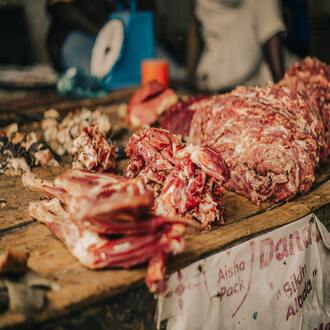Transcription Transition to carnivorous diet
Adopting a carnivorous diet as a way of eating can be a traumatic process for many, this is usually associated with the abrupt changes we make without taking into account that our body needs to adapt gradually.
Eating only animal foods is more complex than it seems, carbohydrates are closely associated with our usual food intake; once they are eliminated, our body will experience processes that can be very difficult to endure, if we add sweets and other foods rich in sugar, the feeling of changing food is like giving up a substance to which we have become addicted.
It would be something like quitting smoking for a smoker. That is why this guide seeks to provide you with the steps to follow in order to make these changes in the least painful way possible.
Gradually reduce carbohydrates
The first mistake that is often made is to abandon the consumption of carbohydrates from one day to the next. This is almost intolerable for our organism. Physical discomfort will soon appear, causing fatigue, nausea and headaches.
It is advisable to reduce the consumption of these gradually, let your body continue to enjoy carbohydrates and adapt it to consume less of them every day. This decrease should be carried out in the way that best suits your conditions, try every day to lower the amount of carbohydrates in your diet.
The most important thing is to be constant, if you manage to reduce every day a little, even in small quantities, your body will be able to tolerate this process naturally.
Should I reduce my carbohydrate intake to zero?
You could say yes. As suggested above, you should reduce your carbohydrate intake to a maximum of 30 grams of carbohydrates per day. You should pay special attention to the products you eat to make sure that your diet does not contain carbohydrates.
If you are adapted to consuming sweet foods, it is important that you make this experience as bearable as possible for your body. There are alternatives that are very low in carbohydrates and sweetened with natural sweeteners that can be a tasty addition to your diet. Naturally the idea is to reduce the consumption of carbohydrates to zero, but as we have stated above, this process cannot represent an abrupt change for your body or it will be unsustainable over time.
Why is it hard to stop consuming carbohydrates?
There are several reasons, from the habit acquired over time to biochemical issues associated with our brain.
The truth is that carbohydrates are generally found in rich foods, and this is due to the dopamine that our brain releases when perceiving these flavors. The dopamine released generates a feeling of well-being and is a process that is related to all kinds of addictions. So to say it in a way, to stop eating carbohydrates is difficult because we are addicted to them.
How to stop ingesting plants?
Plant foods are easier to give up than carbohydrates. The plants that we add to our diet do not cause the effects that we have mentioned in carbohydrates; it is true that there are many factors associated with taste, which are inevitably present, but at least the addictive part will not affect us as in carbohydrates.
What we recommend is that you focus primarily on getting off carbs before focusing on vegetables. Once you have mastered this issue, proceed to eliminate vegetables in the same way. Gradually decrease your vegetable intake until you eliminate them completely, but surely after you have completely abandoned carbs, this second process will be much easier for you.
As you can see, this is a progressive adoption diet. You do not have to be hard on yourself, you must give yourself time to adapt and incorporate these new eating habits in a natural way, abrupt dietary changes usually end up in the subject abandoning the diet because they cannot bear the desires to return to their previous eating style.
transition nutrition carnivore


![Keto and carnivorous diet [relationship]](/images/postDuplicados/Keto_and_carnivorous_diet_relationship.webp)

